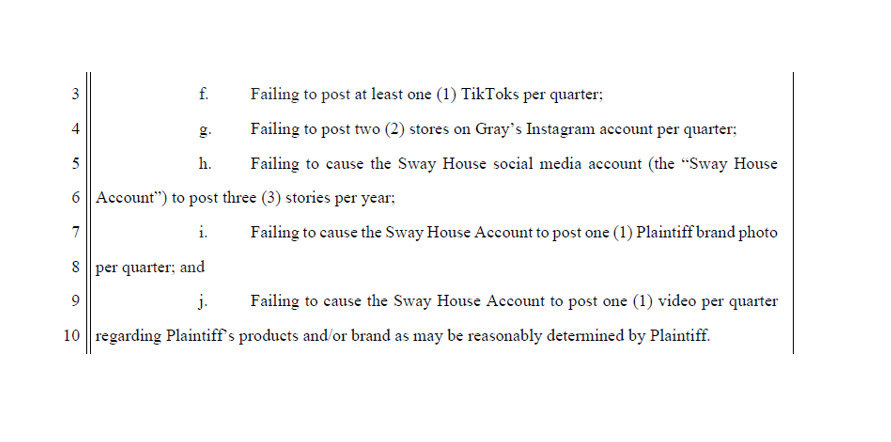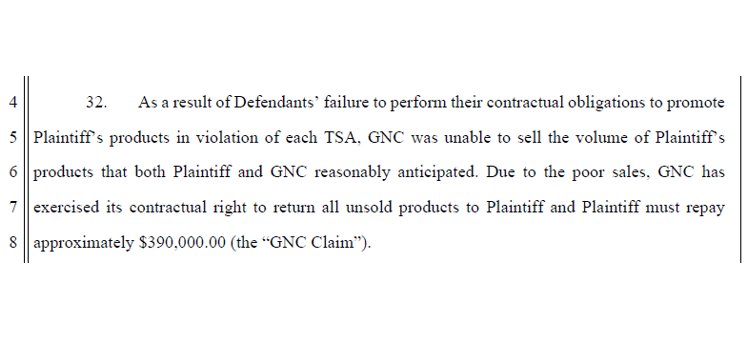Have you ever seen brands offering big discount sales that seem to go on forever? Or when one supposed sale ends, another starts right after it? Have you ever felt like that should be illegal?
Turns out that it is illegal, and it’s something that brands, big and small, are being sued for almost every single day, with big consequences.
Take the fashion brand Boohoo for example. They were sued by consumers who alleged that the so-called “original prices” that the brand marked down were fake, and in 2023, Boohoo agreed to a settlement worth nearly 200 million dollars.
Last year, Hot Topic was sued for the same thing, and they quickly settled the case for $12.5 million. Same story with RugsUSA—sued for fake discounts, settled last year for $14 million.
So what’s going on here? Why have hundreds of brands gotten in legal trouble for this? What makes an advertised discount legitimate versus illegal?
In this video, I’m going to help explain the federal and state laws that apply to advertised discounts, show you some screenshots from cases that resulted in multi-million dollar settlements, and give you some tips to help you stay on the right side of the law.
I should mention that I am a lawyer who focuses on advertising and ecommerce issues, but I’m not YOUR lawyer, and so what I’m going to share is information about the law and not legal advice. If you need advice about your own situation, you should talk to a lawyer in your jurisdiction.
SECTION 1: UNDERSTANDING REFERENCE PRICING
First, let’s clarify what we’re talking about. Reference pricing is when you show a higher “original” or “regular” price, often with a strikethrough, next to a lower “sale” price. It looks something like this:
$100 $75.
This is a powerful marketing tactic because it makes customers feel like they’re getting a deal, especially if they feel like they need to act quickly to take advantage of it. But if something is always on sale, it’s never really on sale, and that’s deceptive. And that’s the premise behind the laws that govern former price comparisons.
The Federal Trade Commission sets out its reference pricing rules in a document called the Guides Against Deceptive Pricing.
The FTC rule says an advertised former price needs to be “the actual, bona fide price at which the article was offered to the public on a regular basis for a reasonably substantial period of time.”
The FTC doesn’t specifically define what constitutes a “reasonably substantial period of time,” which creates some ambiguity. However, the intent is clear – you can’t just raise a price temporarily so you can then “discount” it and claim you’re running a sale.
States like California get more specific.
California has some of the strictest laws in the nation regarding reference pricing, and many major lawsuits have been filed under these regulations.
Under California’s Business and Professions Code § 17501, an advertised former price must have been the prevailing market price within the 90 days immediately preceding the advertisement. If it wasn’t, you must clearly disclose the last date when the product was sold at that price.
And California’s Consumer Legal Remedies act prohibits misrepresenting the reasons for, existence of, or amounts of price reductions.
Let me give you some examples to make this clearer:
Compliant Scenario: A brand sells its jacket for $500 from January through March. For a week in April, they advertise it as “Now $400, was $500.” This is compliant, because the jacket was actually sold for $500 for the past 90 days.
Non-Compliant Scenario: A brand introduces a new shirt and immediately advertises it as being marked down to $150 from $200. This would violate the law because the shirt was never offered for sale at $200.
Another Violation: A brand always runs a sale on a gummy supplement. For the New Year’s sale, it’s 20% off. Then for Valentine’s Day, it’s 30% off. Right when that ends, the Spring Sale is 25% off. That rolls into Easter, then Father’s Day, and so on. If there is always some advertised discount, then the original price hasn’t been the prevailing market price for the last 90 days.
SECTION 2: CASE EXAMPLES
Now let’s look at some major cases that resulted in significant settlements. These examples show just how seriously courts take these violations.
In 2023, online fashion retailer Boohoo and its subsidiaries agreed to a massive $197 million class action settlement over deceptive pricing practices.
The plaintiffs alleged that Boohoo advertised almost all of its products with inflated, “fake” original prices that were rarely, if ever, the actual selling prices. Instead, these reference prices were used to create the false impression that consumers were receiving deep discounts.
As part of the settlement, Boohoo the other brands agreed to add a disclosure on their product pages stating that their original prices are not former prices but instead reflect their opinion of the product’s value. The disclosure reads:
“Our percentage off promotions, discounts, or sale markdowns are customarily based on our own opinion of the value of this product, which is not intended to reflect a former price at which this product has sold in the recent past.”
This can be a compliant way to avoid having the former price laws apply, if the brand clearly and conspicuously explains that strikethroughs are not meant to convey that a savings refers to a former price.
Hot Topic recently settled a class action lawsuit for California and Oregon residents who purchased from their website. The lawsuit alleged that Hot Topic deceptively advertised various discounts on their products.
Basically the same situation as with Boohoo – Hot Topic allegedly advertised fake former prices, consumers sued, and the business agreed to pay $12.5 million to settle.
RugsUSA agreed to a $14.2 million settlement fund to resolve claims that they engaged in deceptive pricing practices on their website.
Like the others, this lawsuit alleged that RugsUSA deceptively advertised discounts, creating the false impression that consumers were getting special deals when they weren’t.
And dozens more like these are filed every week.
You might be thinking, what’s the real harm here? If I pay $40 for a shirt that is advertised as being on sale for $40, haven’t I received exactly what I paid for? That’s the argument that many of these defendants try to make.
Here’s how I think about it. Let’s say I’m in the market for a new hoodie. I don’t want to spend more than $100, so that’s the limit I set when I’m shopping around online. If I saw one for $140, I’m not going to consider it. But if I come across an ad for a sweater that’s normally $400, and the brand tells me that I can get it for $140 today only, I might spend more than I wanted to, thinking I’m taking advantage of a limited-time bargain.
If it turns out the sale was fake, I’ve spent $40 more than I would have if I knew the truth. And if there are a million other customers who bought items from that brand thinking they were getting bargains, the value of the case adds up pretty quickly.
You might also be wondering how these cases get started. What kind of customer would be so upset over a 10- or 20-dollar discount that they want to go to make a federal case out of it? Can’t they just ask for a refund?
Well, a customer is not required to ask for a refund, or even send you a demand letter, before suing. And trying to “moot” a class action by offering the named plaintiff a refund is not a strategy that works.
All it takes to initiate a class action lawsuit is for one customer who purchased your product to connect with a plaintiffs’ lawyer interested in pursuing the case, and it’s often the lawyers who find the clients and not the other way around. If you’ve ever been served an ad on Instagram telling you that you may be entitled to compensation if you purchased from a specific brand, that is a law firm who has identified a violation and is trying to find a plaintiff for the case.
SECTION 3: COMPLIANCE TIPS FOR BUSINESSES
Now that we understand the regulations and have seen the consequences of non-compliance, let’s talk about practical steps your business can take to stay compliant.
First, you want to keep detailed pricing records. So you should maintain comprehensive logs of your product prices, including the dates when each price was in effect, sales volumes at each price point, and screenshots of your website showing the pricing history. This documentation is crucial if you ever need to substantiate your advertised former prices.
Second, understand and comply with the 90-day rule.
To meet California’s strict requirements (which is a good standard to follow regardless of where you operate), you should ensure that any reference price was actually in effect for the majority of the past 3 months. A good rule of thumb is to take any given day that you’re running a sale and ask, were we offering the product at the original price for at least 46 of the last 90 days? If not, you may need to adjust how you advertise the sale today. And if you’re using an older reference price, clearly disclose when that price was last in effect. For example, you could say something like “was $200 until January 1, 2025,” to be transparent.
Third, Avoid Perpetual Sales and Countdown Timers that reset
One big red flag is the “perpetual sale” where items are always discounted. To avoid this, establish a regular pricing cycle with defined sale periods, and return products to their regular prices between promotions. And if you are using a countdown timer, make sure that the sale actually ends when the timer runs out. Many of these lawsuits also include screenshots of timers that supposedly end at a certain time but reappear as soon as they expire.
Finally, be careful with bundle offers. Several of the more recent cases have targeted brands that offer discounts when a customer buys multiple items in one bundle. Brands often will advertise the savings attributable to the bundle by using a strikethrough price. But they need to make clear that the comparison is between the bundle and price of buying the included items individually. You can achieve that by saying something like “bundle and save.” But where brands only use a strikethrough, consumers can argue that they believed the BUNDLE ITSELF is being discounted from a former price it was previously sold for.
It’s a subtle distinction, but that extra clarity can be the difference between a compliant offer and a class action lawsuit.
CONCLUSION
As we’ve seen, deceptive reference pricing can lead to massive legal headaches and settlements in the millions of dollars. The regulations may seem complex, but the underlying principle is simple: be honest with your customers about your pricing.
Remember these key points:
- Reference prices must be real prices at which you’ve actually sold products for a significant amount of time
- California’s 90-day rule is a good standard to follow regardless of where you operate
- Keep detailed records of your pricing history
- Avoid perpetual sales where items are always discounted
- When in doubt, disclose more information rather than less
By following these guidelines, you can use reference pricing as an effective marketing tool in a more compliant way.
















